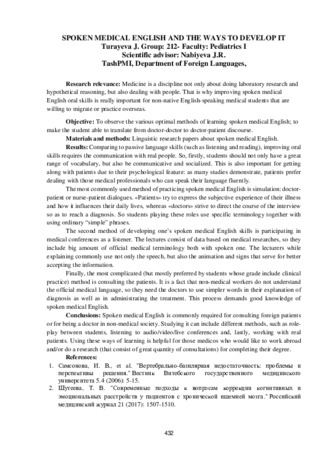
432
SPOKEN MEDICAL ENGLISH AND THE WAYS TO DEVELOP IT
Turayeva J. Group: 212- Faculty: Pediatrics I
Scientific advisor: Nabiyeva J.R.
TashPMI, Department of Foreign Languages,
Research relevance:
Medicine is a discipline not only about doing laboratory research and
hypothetical reasoning, but also dealing with people. That is why improving spoken medical
English oral skills is really important for non-native English-speaking medical students that are
willing to migrate or practice overseas.
Objective:
To observe the various optimal methods of learning spoken medical English; to
make the student able to translate from doctor-doctor to doctor-patient discourse.
Materials and methods:
Linguistic research papers about spoken medical English.
Results:
Comparing to passive language skills (such as listening and reading), improving oral
skills requires the communication with real people. So, firstly, students should not only have a great
range of vocabulary, but also be communicative and socialized. This is also important for getting
along with patients due to their psychological feature: as many studies demonstrate, patients prefer
dealing with those medical professionals who can speak their language fluently.
The most commonly used method of practicing spoken medical English is simulation: doctor-
patient or nurse-patient dialogues. «Patients» try to express the subjective experience of their illness
and how it influences their daily lives, whereas «doctors» strive to direct the course of the interview
so as to reach a diagnosis. So students playing these roles use specific terminology together with
using ordinary “simple” phrases.
The second method of developing one’s spoken medical English skills is participating in
medical conferences as a listener. The lectures consist of data based on medical researches, so they
include big amount of official medical terminology both with spoken one. The lecturers while
explaining commonly use not only the speech, but also the animation and signs that serve for better
accepting the information.
Finally, the most complicated (but mostly preferred by students whose grade include clinical
practice) method is consulting the patients. It is a fact that non-medical workers do not understand
the official medical language, so they need the doctors to use simpler words in their explanation of
diagnosis as well as in administrating the treatment. This process demands good knowledge of
spoken medical English.
Conclusions:
Spoken medical English is commonly required for consulting foreign patients
or for being a doctor in non-medical society. Studying it can include different methods, such as role-
play between students, listening to audio/video/live conferences and, lastly, working with real
patients. Using these ways of learning is helpful for those medicos who would like to work abroad
and/or do a research (that consist of great quantity of consultations) for completing their degree.
References:
1.
Самсонова
,
И
.
В
., et al. "
Вертебрально-базилярная недостаточность
:
проблемы и
перспективы
решения
."
Вестник
Витебского
государственного
медицинского
университета
5.4 (2006): 5-15.
2.
Шутеева
,
Т
.
В
. "
Современные подходы к вопросам коррекции когнитивных и
эмоциональных расстройств у пациентов с хронической ишемией мозга
."
Российский
медицинский журнал
21 (2017): 1507-1510.






